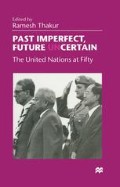Abstract
Only a few years ago it seemed that the widespread euphoria which greeted the end of the Cold War and the demise of communism was going to invigorate the UN system and enhance its role in executing its central function; that of maintaining international peace and security and dealing with threats to peace. Initial success in ending the fighting between Iran and Iraq, and facilitating the withdrawal of Soviet forces from Afghanistan, created an optimistic perception about the continuing and increasing relevance of the United Nations in meeting the challenge of creating order in an anarchic system of states, all of whom still jealously guard their sovereignty and freedom of action.
Access this chapter
Tax calculation will be finalised at checkout
Purchases are for personal use only
Preview
Unable to display preview. Download preview PDF.
Notes
Weekly Compilation of Presidential Documents 26(37), 17 September 1990.
Peter Wallensteen and Karin Axell, ‘Major armed conflicts’, SIPRI Yearbook 1994 (Oxford: Oxford University Press for the Stockholm International Peace Research Institute, 1994), p. 81.
Jacob Bercovitch, ‘International Mediation: A Study of the Incidence, Strategies and Conditions of Successful Outcomes’, Cooperation and Conflict 21 (July 1986), pp. 2155–68.
Gareth Evans, Cooperating for Peace: The Global Agenda for the 1990s and Beyond (Sydney: Allen & Unwin, 1993).
Boutros Boutros-Ghali, An Agenda for Peace: Preventive Diplomacy, Peacemaking, and Peace-keeping (New York: United Nations, 1992).
P. H. Gulliver, Disputes and Negotiations (New York: Academic Press, 1979).
Jacob Bercovitch, Social Conflict and Third Parties (Boulder: Westview, 1984).
D. Frei, ‘Factors Affecting the Effectiveness of International Mediation’, Peace Science Society (International) Papers 26 (October 1976), pp. 67–84.
F. Edmead, Analysis and Prediction in International Mediation (New York: UN Institute for Training and Research, 1971).
F. Northedge and M. Donelan, International Disputes: The Political Aspects (London: Europa, 1971).
Robert F. Randle, The Origins of Peace: A Study of Peacemaking and the Structure of Peace Settlements (New York: Free Press, 1973).
S. Touval, ‘Why the U.N. Fails’, Foreign Affairs 73 (September/October 1994), pp. 44–57.
Brian Urquhart, Hammarskjold (London: Bodley Head, 1973), p. 27.
Editor information
Editors and Affiliations
Copyright information
© 1998 Palgrave Macmillan, a division of Macmillan Publishers Limited
About this chapter
Cite this chapter
Bercovitch, J. (1998). The United Nations and the Mediation of International Disputes. In: Thakur, R. (eds) Past Imperfect, Future Uncertain. Palgrave Macmillan, London. https://doi.org/10.1007/978-1-349-26336-3_4
Download citation
DOI: https://doi.org/10.1007/978-1-349-26336-3_4
Publisher Name: Palgrave Macmillan, London
Print ISBN: 978-0-333-71624-3
Online ISBN: 978-1-349-26336-3
eBook Packages: Palgrave Political & Intern. Studies CollectionPolitical Science and International Studies (R0)

